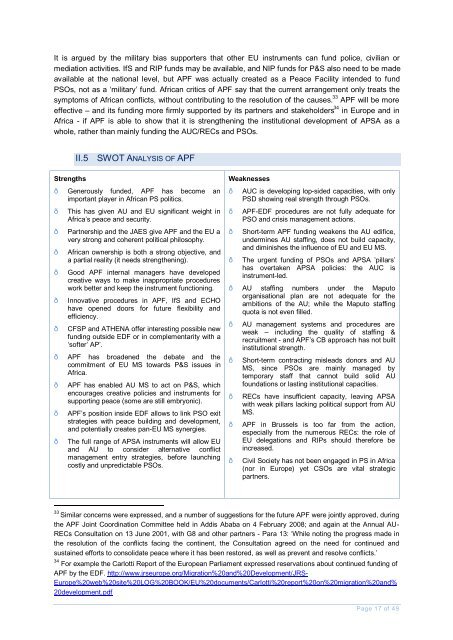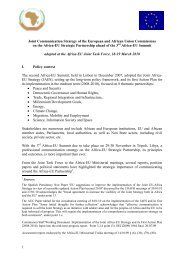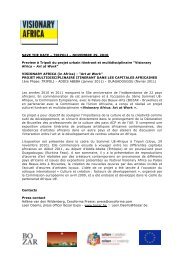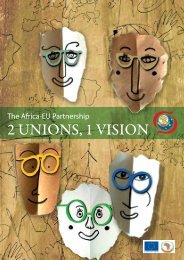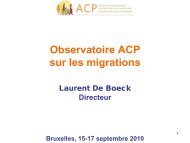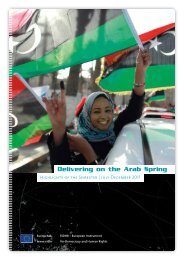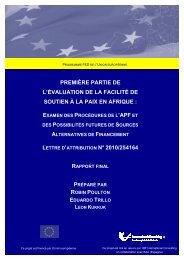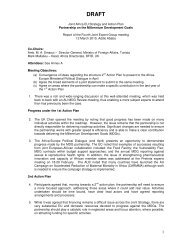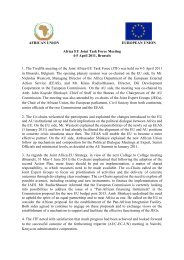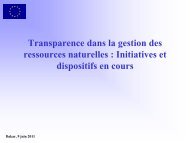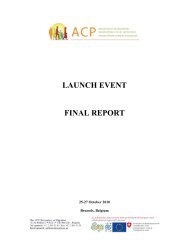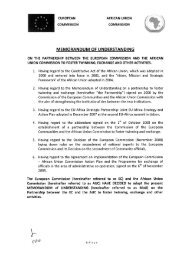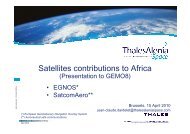part 1 of the african peace facility evaluation - European ...
part 1 of the african peace facility evaluation - European ...
part 1 of the african peace facility evaluation - European ...
Create successful ePaper yourself
Turn your PDF publications into a flip-book with our unique Google optimized e-Paper software.
It is argued by <strong>the</strong> military bias supporters that o<strong>the</strong>r EU instruments can fund police, civilian or<br />
mediation activities. IfS and RIP funds may be available, and NIP funds for P&S also need to be made<br />
available at <strong>the</strong> national level, but APF was actually created as a Peace Facility intended to fund<br />
PSOs, not as a ‘military’ fund. African critics <strong>of</strong> APF say that <strong>the</strong> current arrangement only treats <strong>the</strong><br />
symptoms <strong>of</strong> African conflicts, without contributing to <strong>the</strong> resolution <strong>of</strong> <strong>the</strong> causes. 33 APF will be more<br />
effective – and its funding more firmly supported by its <strong>part</strong>ners and stakeholders 34 in Europe and in<br />
Africa - if APF is able to show that it is streng<strong>the</strong>ning <strong>the</strong> institutional development <strong>of</strong> APSA as a<br />
whole, ra<strong>the</strong>r than mainly funding <strong>the</strong> AUC/RECs and PSOs.<br />
II.5 SWOT ANALYSIS OF APF<br />
Strengths<br />
Generously funded, APF has become an<br />
important player in African PS politics.<br />
This has given AU and EU significant weight in<br />
Africa’s <strong>peace</strong> and security.<br />
Partnership and <strong>the</strong> JAES give APF and <strong>the</strong> EU a<br />
very strong and coherent political philosophy.<br />
African ownership is both a strong objective, and<br />
a <strong>part</strong>ial reality (it needs streng<strong>the</strong>ning).<br />
Good APF internal managers have developed<br />
creative ways to make inappropriate procedures<br />
work better and keep <strong>the</strong> instrument functioning.<br />
Innovative procedures in APF, IfS and ECHO<br />
have opened doors for future flexibility and<br />
efficiency.<br />
CFSP and ATHENA <strong>of</strong>fer interesting possible new<br />
funding outside EDF or in complementarity with a<br />
‘s<strong>of</strong>ter’ AP’.<br />
APF has broadened <strong>the</strong> debate and <strong>the</strong><br />
commitment <strong>of</strong> EU MS towards P&S issues in<br />
Africa.<br />
APF has enabled AU MS to act on P&S, which<br />
encourages creative policies and instruments for<br />
supporting <strong>peace</strong> (some are still embryonic).<br />
APF’s position inside EDF allows to link PSO exit<br />
strategies with <strong>peace</strong> building and development,<br />
and potentially creates pan-EU MS synergies.<br />
The full range <strong>of</strong> APSA instruments will allow EU<br />
and AU to consider alternative conflict<br />
management entry strategies, before launching<br />
costly and unpredictable PSOs.<br />
Weaknesses<br />
AUC is developing lop-sided capacities, with only<br />
PSD showing real strength through PSOs.<br />
APF-EDF procedures are not fully adequate for<br />
PSO and crisis management actions.<br />
Short-term APF funding weakens <strong>the</strong> AU edifice,<br />
undermines AU staffing, does not build capacity,<br />
and diminishes <strong>the</strong> influence <strong>of</strong> EU and EU MS.<br />
The urgent funding <strong>of</strong> PSOs and APSA ’pillars’<br />
has overtaken APSA policies: <strong>the</strong> AUC is<br />
instrument-led.<br />
AU staffing numbers under <strong>the</strong> Maputo<br />
organisational plan are not adequate for <strong>the</strong><br />
ambitions <strong>of</strong> <strong>the</strong> AU; while <strong>the</strong> Maputo staffing<br />
quota is not even filled.<br />
AU management systems and procedures are<br />
weak – including <strong>the</strong> quality <strong>of</strong> staffing &<br />
recruitment - and APF’s CB approach has not built<br />
institutional strength.<br />
Short-term contracting misleads donors and AU<br />
MS, since PSOs are mainly managed by<br />
temporary staff that cannot build solid AU<br />
foundations or lasting institutional capacities.<br />
RECs have insufficient capacity, leaving APSA<br />
with weak pillars lacking political support from AU<br />
MS.<br />
APF in Brussels is too far from <strong>the</strong> action,<br />
especially from <strong>the</strong> numerous RECs: <strong>the</strong> role <strong>of</strong><br />
EU delegations and RIPs should <strong>the</strong>refore be<br />
increased.<br />
Civil Society has not been engaged in PS in Africa<br />
(nor in Europe) yet CSOs are vital strategic<br />
<strong>part</strong>ners.<br />
33<br />
Similar concerns were expressed, and a number <strong>of</strong> suggestions for <strong>the</strong> future APF were jointly approved, during<br />
<strong>the</strong> APF Joint Coordination Committee held in Addis Ababa on 4 February 2008; and again at <strong>the</strong> Annual AU-<br />
RECs Consultation on 13 June 2001, with G8 and o<strong>the</strong>r <strong>part</strong>ners - Para 13: ‘While noting <strong>the</strong> progress made in<br />
<strong>the</strong> resolution <strong>of</strong> <strong>the</strong> conflicts facing <strong>the</strong> continent, <strong>the</strong> Consultation agreed on <strong>the</strong> need for continued and<br />
sustained efforts to consolidate <strong>peace</strong> where it has been restored, as well as prevent and resolve conflicts.’<br />
34 For example <strong>the</strong> Carlotti Report <strong>of</strong> <strong>the</strong> <strong>European</strong> Parliament expressed reservations about continued funding <strong>of</strong><br />
APF by <strong>the</strong> EDF. http://www.jrseurope.org/Migration%20and%20Development/JRS-<br />
Europe%20web%20site%20LOG%20BOOK/EU%20documents/Carlotti%20report%20on%20migration%20and%<br />
20development.pdf<br />
Page 17 <strong>of</strong> 49


